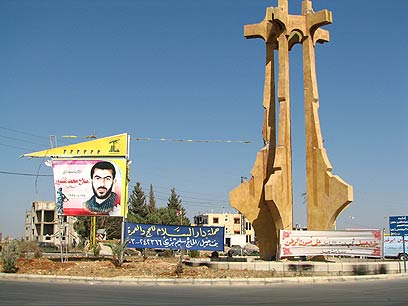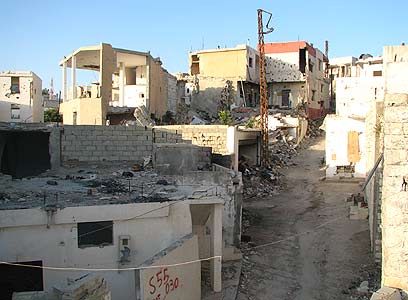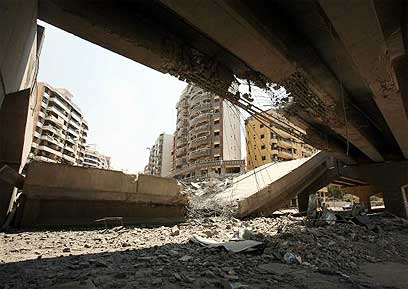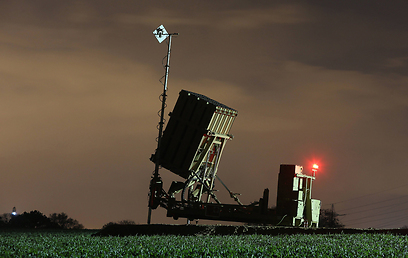Pelosi made one critical mistake when she said you have to first pass 'Obamascare' to understand what is in it. That mistake is most people impacted by "Obamascare" neither can read nor comprehend what is now 13,000 pages of government rules and regulatory gobbledygook!
But then this is from the dingbat (Pelosi Bunker) who does not believe we have a spending problem because we are only 70 trillion in debt. (See 1 below.)
---
Israel self-examines (not Studs Turkel either.).
Name me one Arab/Muslim nation that does anything comparable! (See 2 below.)
---
Did N Korea explode another nuclear bomb ? Maybe Sec. Perry needs to talk with Ms. Clinton and learn about her 'reset' button' strategy. After all, worked so well with Russia!(See 3 below.)
---
Hezballah plans its strategy for the next war - a two part series!. (See 4 below.)
---
Dick
----------------------------------------------------------------------------------------------------------------------------------
1) ObamaCare: The Wheels Are Coming Off ...
By Betsy McCaughey
The central parts of ObamaCare don’t roll out until 2014, but the wheels are already falling off this clunker. The latest news from four federal agencies is that:
1) insurance will be a lot less affordable than Americans were led to expect,
2) fewer people than promised will get insurance and
3) millions of people who have coverage through a job now will lose it, thanks to the president’s “reforms.” Oh, and children are the biggest victims.
The Affordable Care Act is looking less and less affordable.
Start with the IRS’s new estimate for what the cheapest family plan will cost by 2016: $20,000 a year to cover two adults and three kids. And that will only cover 60 percent of medical bills, so add hefty out-of-pocket costs, too.
The next surprise is for parents who thought their kids would be covered by an employer. Sloppy wording in the law left that unclear until last week, when the IRS ruled that kids won’t be covered.
Starting in 2014, the law will require employers with 50 or more full-time employees to offer coverage or pay a penalty. “Affordable” coverage, that is — meaning the employee can’t be told to contribute more than 9.5 percent of his salary. For example, a worker earning $40,000 a year cannot be required to pay more than $3.800.
But the law doesn’t specifically mandate family coverage — and now the administration says that won’t be required.
You can see why: If the lowest-cost family plan (again, two adults and three kids) is to run a whopping $20,000, and if the employee’s contribution is limited to $3,800, the employer’s tab would be $16,200 — adding about $7.40 an hour to the cost of that employee. Wisely, the IRS announced on Jan. 30 that employers won’t have to pay for dependents.
But the Congressional Budget Office’s much-cited prediction that ObamaCare would leave only 30 million people uninsured by 2016 was based on the assumption that kidswould be covered by employers. At the very least, employers insuring their workers for the first time to avoid the penalty are unlikely to do that.
So how will the kids be covered? They won’t. The IRS shocked the law’s advocates by announcing that the insurance exchanges won’t provide subsidies for a child whose parent is covered at work.
Nor will these parents be penalized for not insuring their children — the IRS will kindly consider the kids exempt from the mandate.
Also exempt are millions of people who’ll stay uninsured because their state is wisely choosing not to loosen Medicaid eligibility.
Some background: Despite President Obama’s promises to help solve the problem of the uninsured by making private health plans more affordable, the law expands coverage mainly by forcing states to loosen their Medicaid eligibility rules. But the Supreme Court ruled that the feds can’t command states in this way.
At first, the CBO said that ruling would only prevent 4 million people from gaining coverage — but more states than it expected are refusing to go along; it could well be 8 million more without coverage.
Oh, and the CBO last week also doubled its previous estimate on how many people will lose the health coverage they now get through work, upping the figure to 8 million by 2016 and 12 million by 2019. Several top consulting firms put the figures even higher.
Yet the biggest setback is that most states are refusing to set up insurance exchanges. The exchanges are supposed to sell the government-mandated plans and hand out taxpayer-funded subsidies to most enrollees.
Here’s the glitch. The law says that in states that refuse, the federal government can set up an exchange. But the law empowers only state exchanges, not federal ones, to hand out subsidies. The Obama administration says it will disregard the law and offer subsidies in all 50 states anyway, but the case will likely go to the Supreme Court.
If the courts uphold the clear language of the law, then some 8 million people in the affected states won’t be eligible for subsidies to cover that $20,000 (or more) insurance bill. That’s another 8 million without coverage.
All in all, at least 40 million people could be uninsured in 2016, only 9 million fewer than before the law was passed.
Expect the momentum for repealing this law to grow as its flaws, perverse incentives and faulty predictions come to light.
Betsy McCaughey is the author of “Beating ObamaCare.”
---------------------------------------------------------------------------------------------------------------------------------
2)Israel Reflects
By Michael Curtis
The Turkel Commission Report is a unique and important legal report, 470 pages along with 500 pages of appendices, submitted in February 2013 to Israeli Prime Minister Benjamin Netanyahu. It is not bedside reading but is a comprehensive and rigorous examination of the procedures by which the state of Israel examines and investigates complaints and claims of violations by Israel ofinternational humanitarian law. The commission examined the behavior of Israeli military and political authorities in the light of standards set by international law and the laws of armed conflict. The nature of that behavior which has legal, moral, and educational aspects is important for two reasons: Israel's self-perception; and the perception of Israel by the international community.
At the outset it is manifest that the establishment of the commission, referred to by the name of the chair, the former Supreme Court Justice Jacob Turkel, is an extraordinary tribute to the state of Israel for its willingness to engage in objective self-examination of its military actions. The two reports it has submitted consider and essentially sustain the claim that Israel does attempt to abide by the principles of international law, even though it is confronted by terrorist organizations which reject these principles.
The two objective non-Israeli observers on the commission attest to Israel's willingness to examine its own actions and their accordance with international law. Professor Timothy McCormack, special adviser to the International Criminal Court in The Hague, commented that the state of Israel should be very proud of its contribution to the study of this very important area of law. The other, Lord David Trimble of Ireland, a Nobel Peace Prize winner, concluded that "taken as a whole, Israeli law and practice will stand comparison with the best in the world."
The commission, consisting of retired Supreme Court Justice Jacob Turkel and three other Israeli respected figures and two foreign observers was set up in June 2010 to examine the maritime incident of May 31, 2010 when Israeli forces raided a flotilla of six ships in international waters, the most important of which was the Mavi Mamara, which was challenging the Israeli blockade of the Gaza Strip, imposed after Hamas took control of the area. Nine people were killed during the incident when IDF forces attempted to board the Mavi Mamara.
The commission's initial charge was to investigate the legality of the Israeli blockade and of Israeli actions during the raid. A first report, of 245 pages, was submitted by the commission on January 23, 2011. It came to two main conclusions. The first was that, considering the problem of security in light of continuing attacks against Israel, the Israeli blockade was lawful and complied withinternational humanitarian law. The second was that the Israeli actions on May 31, 2010 regarding the flotilla were lawful and complied with international law pertaining to armed conflict.
The commission cleared the Israeli government and military of accusations of wrongdoing. It held that it was the passengers of the ships, particularly the Mavi Marmara, who were responsible for the violence. It held that the naval blockade of Gaza was lawfully imposed, primarily for military and security reasons to prevent smuggling of weapons and terrorists, and that Israel had complied with its humanitarian obligations in the incident.
Specifically, the commission held that the interception and capture of the flotilla ships was consistent with established international naval practice. It concluded that the participants on the ships were people whose main purpose was to publicize the humanitarian situation in Gaza. However, the ships did not carry humanitarian cargo as claimed but were armed with a wide array of weapons which could cause death or serious injury and which were in fact used against the IDF soldiers. Faced by unanticipated violence, the Israeli response was professional and in conformity with international law.
Though many found the report of the commission to be thorough and objective, it did not satisfy the critics of Israel, some of whom persisted in asserting that Israel was responsible for clear violations of international law. Not unexpectedly, the UN Human Rights Council -- continuing its relentless vendetta against Israel -- was prominent in accusing Israel of violations of human rights andinternational humanitarian law. In response to this criticism, the mandate of the Turkel Commission was extended to allow it to examine the Israeli investigations both of the flotilla incident and those concerning Operation Cast Lead, the attempt from December 2008 to January 2009 to end missile attacks from the Gaza Strip against Israeli civilians.
Few countries in the world engage in critical self-examination. Could Israel effectively and fairly investigate itself for alleged violations of international law? The Turkel Commission, with some changes in personnel, was now charged to consider Israel's mechanisms for examining and investigating complaints about alleged violations of the laws of armed conflict. It not only scrutinized the Israeli military but also police and security organizations, government and judicial officials, and human rights organizations. It focused mainly on the rules of international law, concentrating on assessments of military and investigation procedures, primarily those of the IDF.
It also compared the mechanisms used to review violations of international humanitarian law in Israel with those of six other democratic countries. The overall purpose of the second Turkel report was to identify methods by which existing procedures in Israel could be improved.
Overall, the commission's conclusions were favorable to Israel. It found that mechanisms for investigations generally comply with Israel's obligations under the rules of international law. The commission established that Israeli investigation of senior political figures by investigating committees and inquiries was in accordance with expected international standards. All the same, it did recommend some changes in accepted practice, altogether 18 recommendations, to various branches of the Israeli government and military. These recommendations did not indicate essential flaws but rather were a blueprint for optimal improvement.
Among other issues, the commission suggested that units specializing in the laws of armed conflict should be established, and that a fact-finding assessment team should investigate the legal aspects of individual military operations.
Two other recommendations are particularly important. One called for explicitly integrating rules concerning war crimes into Israeli law. The other emphasized the need for a law that would make IDF commanders and their civilian superiors responsible for violations by those under their command. The commission also recommended that a special unit of the military police investigations department be set up to investigate reports of harm done to Palestinian civilians.
No political or legal system in the world has reached perfection. Critics of Israel will undoubtedly focus on its imperfections and on the shortcomings pointed out by the Turkel Commission Report. In contrast, any objective analyst, like the two non-Israeli observers on the commission, is likely to stress that the objective of the commission, which was to see that Israel conforms to international law which is often vague and unclear, has been admirably fulfilled and that Israel can justifiably take pride in this.
---------------------------------------------------------------------------------------------------------------------------------------------
3)
| CTBTO STATEMENT ON THE SEISMIC EVENT DETECTED IN NORTH KOREA | |||
| STATEMENT BY CTBTO EXECUTIVE SECRETARY TIBOR TOTH ON THE SEISMIC EVENT DETECTED IN NORTH KOREA AS A RESPONSE TO MEDIA QUESTIONS “Today our monitoring stations picked up evidence of an unusual seismic event in the Democratic People’s Republic of Korea (DPRK). The event shows explosion-like characteristics and its location is roughly congruent with the 2006 and 2009 DPRK nuclear tests. For now, further data and analysis are necessary to establish what kind of event this is. If confirmed as a nuclear test, this act would constitute a clear threat to international peace and security, and challenges efforts made to strengthen global nuclear disarmament and non-proliferation, in particular by ending nuclear testing.” Background: A total of 183 States, representing the vast majority of the international community, have so far signed the Comprehensive Nuclear-Test-Ban Treaty (CTBT), underscoring their support for a definitive ban on nuclear explosions. Of these, 159 have also ratified the Treaty. To enter into force, however, the CTBT must be signed and ratified by 44 specific States. These States participated in the negotiations of the Treaty in 1996 and possessed nuclear power or research reactors at the time. Thirty-six of these States have ratified the Treaty, including the three nuclear weapon States: France, the Russian Federation and the United Kingdom. Of the eight remaining States, China, Egypt, Iran, Israel and the United States have signed the Treaty, whereas the DPRK, India and Pakistan have not yet signed it. A verification regime is being built to monitor compliance with the Treaty. Over 85 percent of the 337 facilities in the International Monitoring System are already in place; see interactive map. The Member States are provided with data collected by the monitoring stations, as well as data analyses prepared by the International Data Centre in Vienna, Austria. Once the Treaty has entered into force, an on-site inspection can be invoked in case of a suspicious event. The North Korean nuclear tests on 9 October 2006 and 25 May 2009 were immediately detected by the CTBTO’s monitoring stations. ------------------------------------------------------------------------------------------------------------------------------------------- 4)Hezbollah moves into south Lebanon villages
Analysis: Terror group storing rockets in private homes it sold to poor Shiite families at bargain prices
Part one of analysis by Ron Ben-Yishai
At the same time, the Shiite terror group launched a major social/real-estate project that bolstered its political standing: It purchased lands on the outskirts of the villages, built homes on these lands and offered them to poor Shiite families at bargain prices (to rent or buy), one the condition that at least one rocket launcher would be placed in one of the house's rooms or in the basement, along with a number of rockets, which will be fired at predetermined targets in Israel when the order is given. 
Rockets in the basement. Bint Jbeil (Archive photo: Rinat Malkes)
Another issue, perhaps even more urgent, relates to Hezbollah's preparations for the day Syrian President Bashar Assad's regime collapses. According to experts, Hezbollah's leadership is aiding Assad not only because it was ordered to do so by Iran, but also because Nasrallah believed at the onset of the revolt that the Syrian president would be able to crush the opposition within a short period of time and then be indebted to the Shiite "brothers" from Lebanon and bolster the ties with them.

Bint Jbeil after the 2006 war (Archive photo: Rinat Malkes)
The Hezbollah leader is currently trying to transfer from Syria weapons he was supposed to receive – as part of a past agreement - only in the event of a military conflict with Israel. He is even making certain to maintain territorial contiguity between Shiite population centers in north Lebanon and the Alawite enclave that is gradually being established along the Syrian coastline. Moreover, Nasrallah is working to maintain his legitimacy inside Lebanon amid the criticism leveled at him by other ethnic groups over his support for the Assad family. However, he is focusing mostly on the preparations for a war with Israel.
Despite the fact that there are those in Israel who claim that the deterrence achieved against Hezbollah during the Second Lebanon War has been eroded, it is fairly clear that at this point Nasrallah's organization does not want to get involved in a major conflict with the Jewish state. Lebanon's national elections are scheduled for June, and Hezbollah does not want its political legitimacy and dominance to be challenged because it dragged the country into a devastating war with Israel. There is enough tension and violent clashes between Shiites and the Lebanese Sunnis, who are assisting the Syrian rebels trying to topple Assad. Hezbollah's strategy: Rockets on Tel Aviv, raids on Galilee
Analysis: Nasrallah hopes to gain moral victory by inflicting heavy casualties on IDF, Israeli home front at onset of next conflict
Part two of Ron Ben-Yishai analysis The northern border has been relatively quiet for the past six years, but during this time Hassan Nasrallah continued to closely monitor the developments in Israel. Over the past month I have spoken with a man who has dedicated a large portion of his adult life to studying Hezbollah and its leadership. According to him, Nasrallah learned to read Hebrew so he could understand the Israeli political system and the forces that drive Israeli society. 1) Rocket and missile salvos on the periphery do not impress the Israelis. Only a devastating strike on the Tel Aviv metropolitan area or on Tel Aviv itself, or an attack on a key infrastructure facility, will deal a serious blow to public morale in Israel and around the world and grant him the victory photos he craves. 
Will pinpoint airstrikes do the job? Site of IDF attack in Lebanon during 2006 war (Photo: Reuters)
In addition to the attack on the Tel Avivian home front and infrastructure, Nasrallah plans to cause heavy casualties among Israeli soldiers who will enter Lebanon in order to stop the firing of short-range rockets from the southern part of the country. To carry this plan out, his men will use thousands of advanced anti-tank missiles, bombs and mortars that have been deployed in villages. The goal is to kill and injure hundreds of Israeli soldiers. These losses, along with the IDF's inability to stop the rocket and missile fire until the latter part of the war, will grant Nasrallah an unprecedented moral and physical victory –particularly if Hezbollah will manage to down Israeli planes or sink a ship.

Israeli ship hit during Second Lebanon War
Another possibility is that Hezbollah will launch rockets and missiles toward Israel in the event of a massive IDF attack in Lebanese territory. However, the probability that the Shiite group will get involved in a war with Israel over attacks on convoys transporting modern weapons or chemical weapons from Syria to Lebanon (such as the recent airstrike on a convoy transporting advanced anti-aircraft missiles, which foreign media outlets attributed to Israel), is not high. It's response to such attacks will most likely be limited.

Not the answer. Iron Dome battery (Photo: Elad Gershgoren)
"Wherever we can, we will take the non-combative Lebanese population into consideration, but we will not be able to employ selective methods everywhere. There will be a lot of destruction there, and many casualties. Our goal is to lift the threat without a war, but when you do go to war, you have to do it right," the senior IDF official said.
| |||
No comments:
Post a Comment